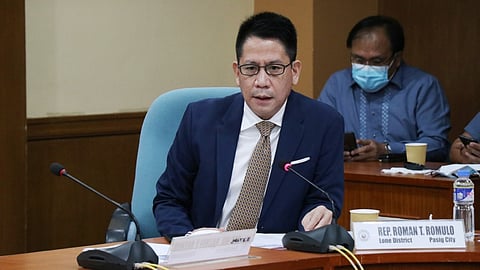
- NEWS
- the EDIT
- COMMENTARY
- BUSINESS
- LIFE
- SHOW
- ACTION
- GLOBAL GOALS
- SNAPS
- DYARYO TIRADA
- MORE

Pasig Representative Roman Romulo called for stricter oversight of the government’s Senior High School (SHS) voucher program, citing concerns over monitoring, accountability, and the quality of education in private schools accepting government-assisted students.
Romulo revealed that issues with the SHS voucher program have long been raised, dating back to the previous Congress.
“We noticed that many students are enrolled in the voucher program, but there is a lack of proper monitoring,” he said in a radio interview on Sunday.
He pointed out that this prompted the passage of the Expanded Government Assistance to Students and Teachers in Private Education (E-GASTPE) to tighten oversight and enable the Department of Education (DepEd) to address irregularities more swiftly.
“DepEd itself admitted that there are ongoing investigations into certain schools. That’s good news because our goal is to re-examine and conduct oversight on this issue,” he added.
Origins and Gaps
Romulo traced the program’s roots back to the implementation of the K-12 system in 2016, when a severe shortage of classrooms led to the creation of a voucher system allowing Grade 10 completers to enroll in private schools if public schools had no available space.
However, he noted that the guidelines lacked strict quality control measures.
“There were no clear criteria — if you completed Grade 10, you were automatically eligible,” Romulo said, emphasizing that the policy prioritized accessibility over quality.
He cited Department Order (DO) 46, which mainly aimed to ensure private schools could absorb students rather than guarantee high educational standards.
The government allocated approximately P40 billion to the program last year — P12 billion for the Education Service Contracting (ESC) program for junior high school students and P27 billion for SHS vouchers.
Despite this significant funding, Romulo questioned whether the system effectively ensures that students receive quality education.
Romulo identified structural flaws in how institutions were established, particularly regarding their permits to operate.
"The issuance of a permit to operate was not stringent. Monitoring was also lacking," he said.
To address these gaps, he proposed subjecting voucher recipients in private schools to standardized assessments like the National Achievement Test (NAT) to evaluate educational quality.
“If you’re a private school and you want your students to be recipients of the voucher system, your students should take standardized tests, like the NAT, to measure performance,” he said.
Romulo also highlighted the nationwide classroom shortage, estimating a deficit of about 165,000 classrooms. He reiterated that while the voucher system provides immediate relief, long-term solutions require constructing more public school classrooms to meet demand.
Accountability
Regarding reports of “ghost students” benefiting from the voucher system, Romulo asserted that those responsible must be held accountable.
“We can’t just pinpoint individuals — it’s an institutional issue that needs fixing through proper monitoring and evaluation,” he said.
He further emphasized that while accessibility to education is crucial, ensuring quality should be the government’s top priority.
“We don’t just want to provide access; we want to guarantee quality education for those under the voucher program,” he concluded.
